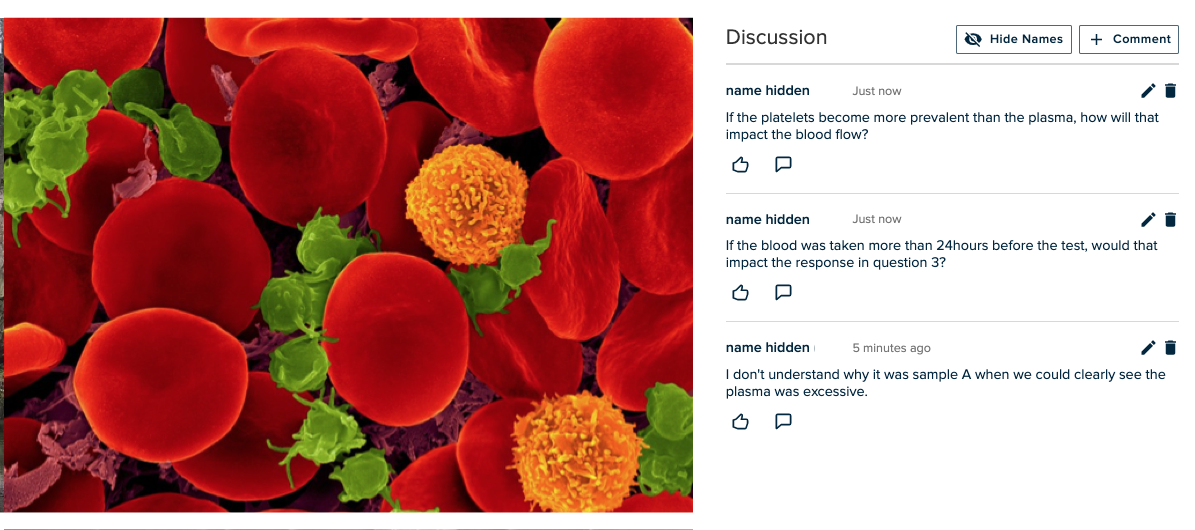
by Alison Maloney
A leading haematologist, a Rhodes scholar and one of her students’ favourite lecturers, Professor Wendy Erber identifies as a traditional lecturer – and she makes no apologies for it. While she admits to enjoying the ‘performance’ that happens when she lectures to students physically sitting in front of her, she cares first and foremost about her students and their opportunities to learn.

Professor Erber says, “I was not one really enamoured by digital learning. I really enjoy being in front of the class. However, I have seen over the past 18 months that we can use digital tools, and that the functionality that Echo360 has offered me has really changed my thinking. It has been engaging, interactive and educational, and I think the students are doing at least as well, if not better, using Echo360.
Professor Wendy Erber, UWA Tweet
Professor Erber has been teaching pre-med students about blood diseases for many years and has come to realize that the most critical part of the instruction isn’t in fact the wet, hands-on skills, but the ability to interpret the data. To that end, she looks at blood, blood count, and blood films with her students – and she can do that with them in a virtual environment.
“In the lab, I started with what is really a Power Point presentation, giving the students some information prior to them doing a task, and then I posed a question and exercise for them to interpret some data. When I closed the poll, I showed them their results, and that then showed what the class feels is the correct answer. I then talked through why a particular answer was correct and why the others were incorrect. Exercise two (2) is a similar question and I could see performance increase from 75% correct to 85% correct. And then again with exercise three, and so on. “
Hear Professor Erber talk about her virtual labs
It was one of Wendy’s students who revealed to me that some of the students also like to ‘play’, by deliberately answering incorrectly. Neither the students nor Professor Erber seem to mind it. In fact, both said that they saw it as a deliberate learning tactic. “Because some of them were so blatantly wrong, it came across to me that they were doing it quite deliberately to get me to talk through what a particular diagnosis was. So, I think it enhanced their learning by giving a deliberately incorrect answer – an interesting ploy,” she explained.
For the new academic year, Professor Erber is thinking about making the deliberate choice to break her lectures up into sections. “The traditional lecture is 45 minutes and a bit like mastermind. I’ve started, so I’ll finish. Over the last few years, we’ve recognised that people’s attention span is much shorter than that. I think in in any one of my lectures, there are three or four main pieces of content, and so the lecture could in fact, be naturally broken into those segments. Ten (10) or twelve (12) minutes of didactic education and let’s take a break and I’ll let you reflect on that.

Not every student picks it all up at the time in the lecture, but it would be a chance for them to show that they have either learned or they have a question. We’ll have those questions retained on Echo360 in perpetuity. I will then respond either in real time or later, and then they can have sort of a Q and A or frequently asked questions.”
I think shorter, sharper pieces might just retain their attention a little longer.
She continues, “By naturally breaking it into pieces, it will then say to the student watching a capture, that is the end of that first piece, and you might now want to stop. You might want to play it again, and then we’ll move on to the second component and learning outcome of this lecture. Any questions? Put them into chat. I think shorter, sharper pieces might just retain their attention a little longer. I don’t know if it’ll improve their learning – time will tell.”
Each of the students that I interviewed commented on Professor Erber’s teaching style, not only her easy and clear explanations but more importantly, they all feel that they have a connection to her. They know that she cares and that she takes time to make them feel comfortable. Currently, with the increase in students struggling with their mental health and feeling disconnected, it’s as important a part of their learning experience as the polls are.
